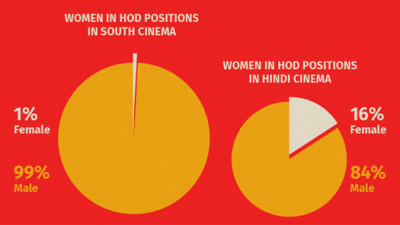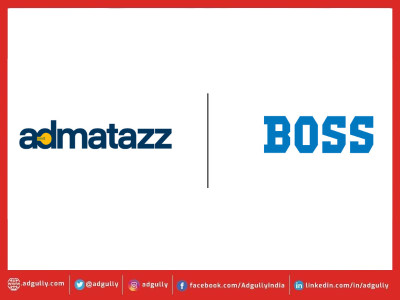Only 8% HOD positions in Indian films in 2019-20 were held by women
On the occasion of International Women’s Day (March 8) this year, media consulting firm Ormax Media and entertainment platform Film Companion have released a report on representation of women in Indian films, titled O Womaniya! 2021. This first-of-its-kind report will be an annual initiative that aims to start necessary conversation about the need for gender parity in Indian cinema.
The report is based on analysis of 129 Indian films released in 2019 & 2020 across five languages, i.e., Hindi, Tamil, Telugu, Malayalam & Kannada. The list includes the top 100 theatrical films based on their footfalls in India, and 29 direct-to-OTT films that were promoted prominently in this period. The report looks at three aspects of representation: Talent, Content & Marketing.
In the Talent section of the report, five key HOD positions for the chosen films were analysed, namely direction, writing, cinematography, editing and production design. Only 8% HOD positions were held by women. Direction and Cinematography are particularly lopsided, at just 6% and 2% female representation respectively.
While female HOD representation in Hindi cinema is low at 16%, it is almost non-existent in South cinema, at just 1%.
The Content section of the report uses the Bechdel Test. The Bechdel Test is an Internationally-accepted measure of female representation in film stories. For a film to pass the Bechdel Test, it needs to meet a basic requirement: It should have at least one scene in which two female characters are talking, and the conversation is about a topic other than a man/men. As many as 59% films, including some of the biggest Hindi and South blockbusters, failed the Bechdel Test.
In the Marketing section, trailers of the 129 were analysed, and the speaking time allotted to male and female characters in these trailers was measured. The report reveals that with 81% speaking time, male characters ‘outspeak’ female characters by more than four times in film trailers, thus concluding that most films are being marketed via male actors and characters. Only 10 out of 129 films had trailers where women spoke more than men.
Speaking on the need for the report, Anupama Chopra, Founder & Editor, Film Companion, said: “We all know that the playing field is skewed in favour of men, but the numbers reveal how stark the difference is. I’m thrilled that we could partner with Ormax Media on this report, and I hope that the O Womaniya! report will ignite a conversation and hopefully, change.”
Speaking on the findings, Shailesh Kapoor, Founder & CEO, Ormax Media, said: “The extremity of the numbers in the report should serve as an eye-opener for all stakeholders. Single-digit percentage representation in key HOD positions is a sign that there’s a deep-seated cultural issue to address. By tracking these factual metrics year-on-year, we will be able to conclude whether the shift in views related to gender equality in cinema are real or merely perceptual”.


















Share
Facebook
YouTube
Tweet
Twitter
LinkedIn